Saags are winter’s delight. The arrival of the cool weather also brings with its different types of leafy greens (saag). Traditionally, in India saag is consumed by almost every family in one or the other form. Saags are relished not just as a normal food but are included as special cuisine in some of the winter festivals. The pure objective is to consume leafy greens for their nutritional and health benefits as some of these saags are available only during winter. Bathua is one such saag which is winter’s charm. Therapeutically, bathua’s fresh leaves and stems are full of nutrients. The medicinal property of Bathua is mainly found in its leaves and seeds. Bathua leaves benefit due to its various nutrients such as protein, fat, fiber, minerals, and vitamins. This article will delve into bathua leaves benefits along with its nutritional value.
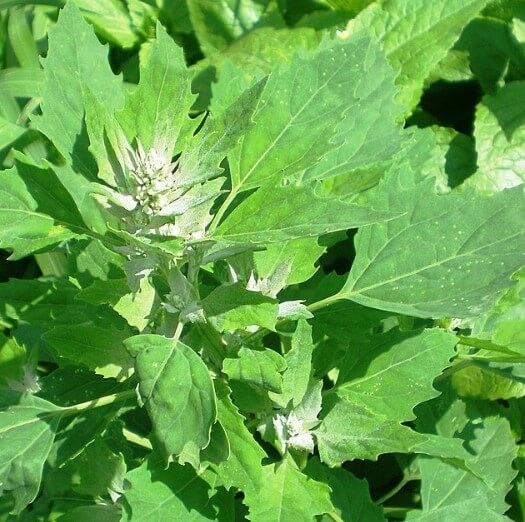
Image courtesy: Wikimedia.org
What Is Bathua Leaves?
Bathua leaves, also known as Chenopodium album, are a nutritionally rich green vegetable commonly consumed in India and other parts of the world. The chenopodium album plant is very adaptable and grows easily. It has leaves with many shapes and a unique waxy texture. The plant grows quickly and is very common in areas with moderate climates. It grows in soil rich in nitrogen and is often found in wastelands. The plant grows upright first and can reach 30-80 cm in height. The stems are sturdy, can have angles, and may have red, green, and purple stripes. The leaves are simple in shape, some may be diamond-shaped and others may be long and narrow. Near the top they are smooth, while the ones near the bottom may have teeth or irregular edges. The leaves are coated with a waxy, powdery layer giving them a whitish appearance and water-resistant. Other common names of the plant are lamb’s quarters, melde, goosefoot, wild spinach, and fat-hen.
Bathua Leaves Nutritional Value
The powerhouse of essential nutrients and bioactive compounds makes the bathua leaves a beneficial herb to be added to one’s diet. A detailed breakdown of bathua leaves nutritional value is provided for you:
1.) Macronutrients
- Protein: Bathua leaves are rich in protein with a high concentration of essential amino acids such as lysine, leucine, and isoleucine. These are needed for muscle repair, immune function, and overall growth.
- Fiber: Bathua leaves have high fiber content, 4-6 g per 100 g. The fiber in bathua leaves keeps the digestive system healthy.
2.) Vitamins
- Vitamin A: Bathua leaves are a good source of vitamin A, approx., 11,000 IU per 100 g. Vitamin A is needed for good vision, immune system, and skin health.
- Vitamin C: Bathua leaves are also an excellent source of vitamin C, 80-155 mg per 100 g. Vitamin C help keep the immune system strong and act as a powerful antioxidant.
- Carotenoids: They are also rich in carotenoids, 12.5 mg per 100 g, which play a crucial role in protecting cells from oxidative damage.
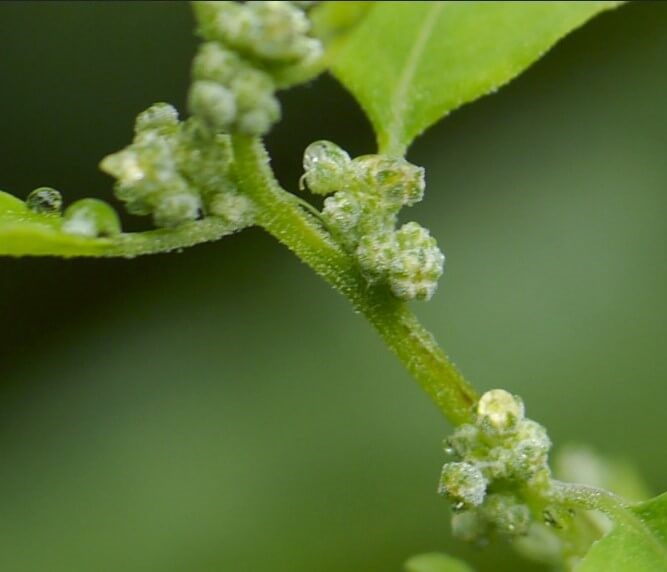
Image courtesy: flickr.com
3.) Minerals
- Calcium: Bathua leaves are a significant source of calcium needed for stronger bones and teeth.
- Iron: The iron content in bathua leaves is higher than that of common spinach and cabbage but less than that of amaranth leaves.
- Magnesium and Manganese: Bathua leaves are particularly a rich source of magnesium and manganese, both are essential for metabolic and antioxidant functions.
- Zinc: These leaves are also rich in zinc, essential for immune system health and enzymatic functions.
- Sodium and Potassium: The ratio of sodium to potassium in bathua leaves is less than one. This makes bathua leaves beneficial for preventing high blood pressure and supporting cardiovascular health.
4.) Fats
Bathua leaves are a rich source of Omega-3 fatty acids essential for brain health and reducing inflammation.
5.) Phytochemicals and Bioactive Compounds
Herbal plants are particularly rich in bioactive compounds making them beneficial for human health. These plants have been used since ancient times for therapeutic purposes because of this quality. Some of the bioactive compounds found in bathua leaves include:
- Flavonoids
- Phenols, Saponins, and Phytosterols
- Essential Oils
It is better to consume bathua leaves fresh as their nutritional quality declines as the plant matures.
Bathua Leaves Benefits
Leaves of bathua are rich in nutritionally important components which make them good for health. Bathua leaves benefits have been redeemed in various forms as powder, paste, juice, decoction, mixture, or as a cooked vegetable. Let us look at some of the traditional and modern bathua leaves benefits.
Traditional Bathua Leaves Benefits
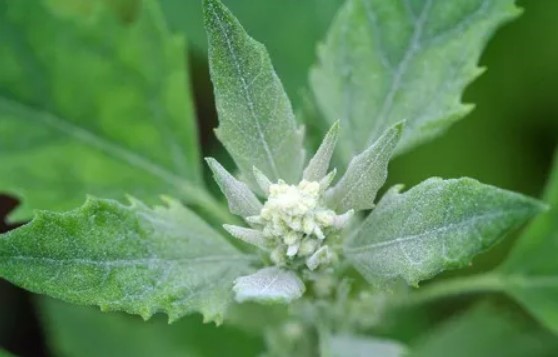
Image courtesy: picturethisai.com
Many ancient texts like Ayurveda, Atharva Veda, Charak Samhita, Sushruta Samhita, etc. have mentioned the medicinal properties of various species of Chenopodium. The evidence of hunter-gatherers eating bathua throughout the Bronze Age and Iron Age proves that it was an important food source for ancient civilizations. Even Napoleon Bonaparte reportedly relied on Bathua seeds to feed his army during difficult times. Firstly, let us look at some of the traditional bathua leaves benefits.
People used bathua leaves to:
- Combat intestinal worms, especially roundworms and hookworms.
- Treat digestive issues such as constipation, stomach pain, and indigestion.
- Prevent scurvy.
- Prevent respiratory and throat problems.
- Treat arthritis and joint pain when applied externally with alcohol.
- Heal burns and skin irritations when used as juice or powder.
Research-Backed Bathua Leaves Benefits
Modern science has studied bathua leaves for their purported benefits. Some of the research-backed bathua leaves benefits are:
1.) Antioxidant Benefits of Bathua Leaves
Bathua leaves have shown antioxidant properties in scientific studies. This quality of bathua leaves protects the cells from the damage caused by free radicals, reduces the risk of chronic diseases, and supports the overall well-being.
2.) Antimicrobial Properties
Bathua leaf extracts have shown remarkable antimicrobial activity against a variety of bacteria and fungi. Bathua leaves benefits in promoting gut and skin health by fighting against infections.
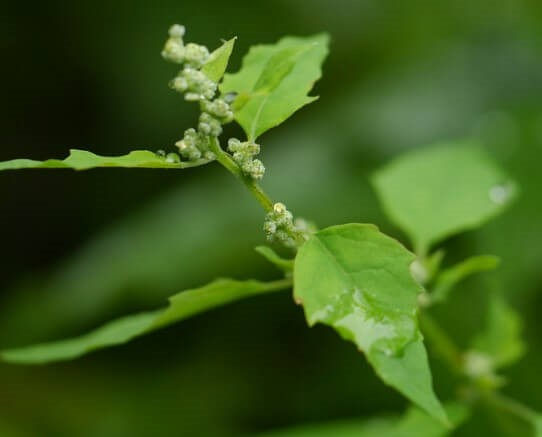
Image courtesy: flickr.com
3.) Anti-inflammatory Benefits
Bathua leaf extracts effectively reduce swelling and alleviate mild pain, such as earaches or joint pain. They can reduce inflammation and pain in cases of arthritis.
4.) Bathua Leaves Benefits as a Natural Cleanser
Bathua leaves have diuretic properties. It can purify the blood and support the kidney health with its diuretic abilities.
5.) Bathua Leaves Benefits in Protecting Liver
Studies on bathua leaves have shown they are as effective in protecting the liver as some common liver-protecting medicines. Bathua leaves protect the liver against toxins. They help repair liver cells, aiding in the healing of liver damage.
6.) Bathua Leaves Benefits for Heart
Bathua leaves may act as a mild heart tonic and benefit cardiovascular health.
7.) Benefits Stomach Health
Bathua leaves have shown the ability to protect the stomach’s inner lining from the damage caused by stomach acid, toxins, or irritants. It also relaxes the intestinal muscles, which can help alleviate cramps and improve digestion. It also can heal stomach ulcers.
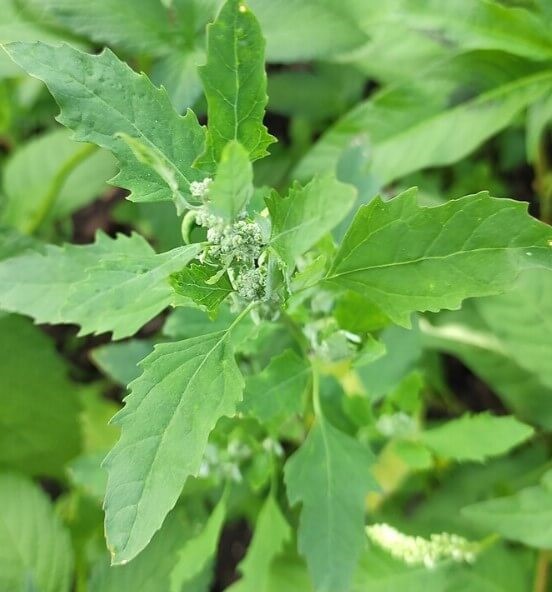
Image courtesy: Wikimedia.org
8.) Anticancer Benefits
Preliminary studies have found that the bioactive compounds in Bathua leaves can stop the growth of certain cancer cells, such as breast cancer.
9.) Benefits for Reproductive Health
Bathua leaves benefit male reproductive health by increasing sperm count and health performance as per studies.
Also Read:
- Neem Datun Benefits: A Natural Way to Keep Teeth & Gums Super Healthy
- Amla Juice Benefits for Skin: Nature’s Elixir for Radiance
10.) Deworming Effects of Bathua Leaves
Bathua leaves are effective in repelling parasitic worms from the body. They provide relief from gastrointestinal issues caused by these parasites.
How to Use Bathua Leaves
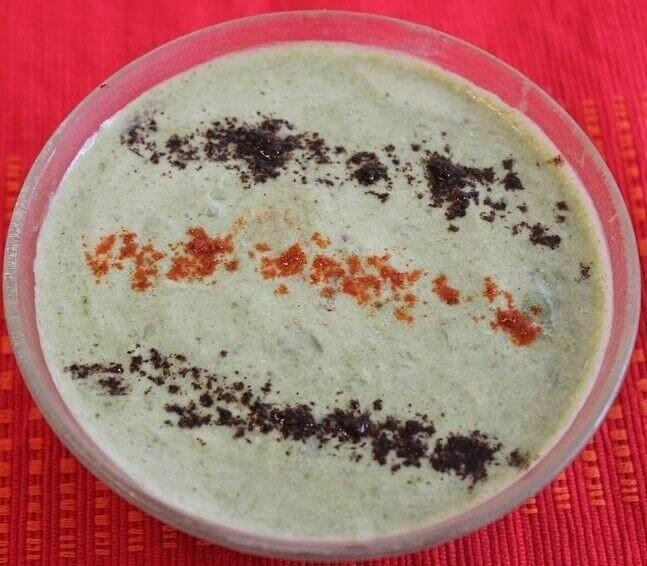
Image courtesy: Wikimedia.org
Use bathua leaves in various ways:
- Add them to salad and soups for a healthy twist.
- Mix the leaves with fresh yogurt and spices to make tasty raita.
- Knead them with flour to make delicious paranthas.
- Cook the leaves with daal or as a standalone vegetable.
- Apply the juice of bathua leaves to skin burns or use it as a paste for inflammatory conditions.
- Prepare a decoction of bathua leaves for internal cleansing and improved digestive health.
Takeaway Message
Bathua leaves offer rich nutritional content and extensive medicinal benefits. The traditional practice of eating bathua during winter is because it acts as a natural remedy against various health conditions. Bathua leaves benefits your overall health and wellness, making them a must-have in your winter meals. However, remember that excessive consumption of bathua may lead to oxalate buildup which may lead to kidney stones. Therefore, always practice moderation eating bathua leaves.
Disclaimer: The views expressed in this article should not be considered as a substitute for a physician’s advice. Please consult your treating physician for more details.
How do bathua leaves contribute to general nutrition?
Bathua leaves (chenopodium album) are packed with vitamins A and C, calcium, and iron, making them a great addition to a balanced diet for overall health.
Can bathua leaves support healthy digestion?
The fiber in bathua leaves helps promote regular bowel movements and supports gut health. You can use it in soups, parathas, you will also get digestive benefits from it.
How do bathua leaves benefit skin and hair?
Bathua leaves are rich in antioxidants and vitamins, bathua leaves may help maintain healthy skin and hair by reducing oxidative stress when consumed regularly as part of a healthy diet.
What’s an easy way to include bathua leaves in meals?
Bathua leaves can be sauteed with spices, blended into smoothies, or mixed into dough for rotis and parathas, its taste is like eating a little spinach.
Can bathua leaves boost immunity?
The vitamin C and antioxidants in bathua leaves may support the immune system by fighting free radicals, making them a great seasonal green for overall wellness.

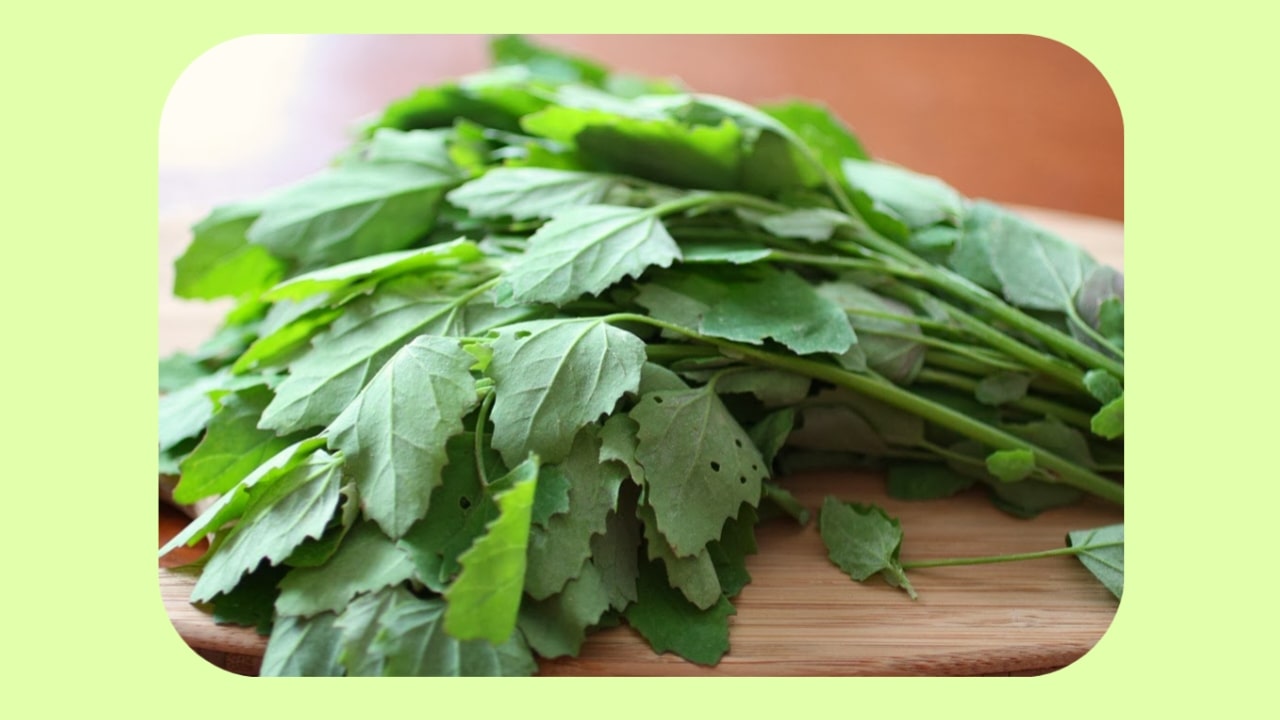
बथुआ के बारे में कमाल की जानकारी। तुम अपने.लेखों में बहुत श्रम और शोध करती हो वह भी अपनी गज़ब व्यस्तता के बावजूद।यह श्लाघनीय है।
Thanks a lot for your comments.
Bathua leaves benefits are amazing.
Thanks a lot for your comments.